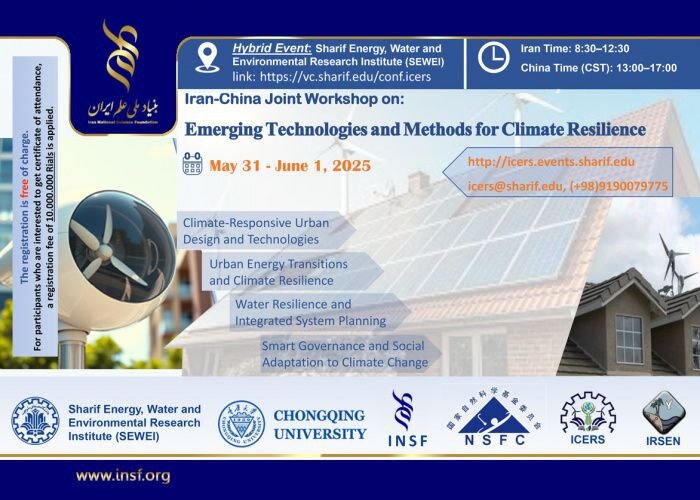Supported by the Iranian National Science Foundation (INSF) and China’s National Natural Science Foundation (NSFC), Tehran will be held on Saturday and Sunday to focus on new ways to increase climate change resilience.
The workshop entitled “Emerging Technologies and Method for Climate Resilience” is hosted by Sharif University of Technology and Chongkin University in China. It is conducted in person and online in English. The main objective of the workshop is to identify the most innovative ways to enhance the city’s climate change resilience, the IRNA reported.
The workshop focuses on climate-responsive urban design and technology, climate risk management, risk, urban energy transition, climate recovery, water resilience, integrated systems planning, smart governance, social adaptation to climate change, and new technologies to manage climate system modeling to assess and predict climate change.
It is also highlighted in the development of collaborative solutions, international cooperation and collaboration, and joint solutions to enhance urban resilience using big data in artificial intelligence, machine learning, and climate change, and analysis and adaptation of sustainable infrastructure.
According to the former permanent representative and ambassador of the Food and Agriculture Organization (FAO), climate change has had a major impact on the agricultural sector and food security in many countries, affecting rainfall patterns, pollination, flowering, and even harvest times.
In some parts of the country, temperatures have risen 2 degrees, but the global maximum temperature is 1.5 degrees.
Studies show that if the temperature of the planet rises to a degree, evaporation increases by 23%, negatively affecting the agriculture and animal and animal livestock sectors.
Climate change also changes plant growth patterns and disrupts the nutritional value of crops, he emphasized.
Furthermore, the unexpected effects of climate change, such as drought, floods and landslides, all have impacted food security.
INSF supports the implementation of NSFC 10 joint projects
According to a report released in January, Iran and China will support the implementation of 10 of the 136 research projects proposed following the fourth joint call by the INSF and NSFC.
These projects cover three areas: regenerative medicine (bioengineering or materials for regenerative medicine), and the environment (treatment of water and solid waste).
In addition to these research projects, three of 21 joint workshops on industrial engineering, advanced materials, climate change in construction, artificial intelligence and big data have been approved.
The proposal was initially discussed in countries, and then specialized working groups evaluated the project in the International Committee. The results were then exchanged for the Chinese Academy of Sciences.
mt/mg

